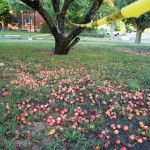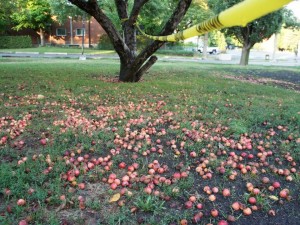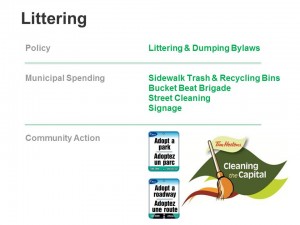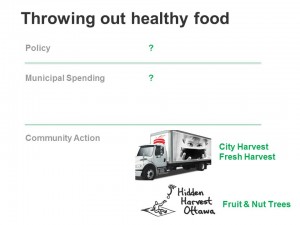
Food waste is the litter of the 21st century.
That is to say, people’s perception & understanding of food waste are changing today in much the same way that people’s perception & understanding of litter changed back in the 50’s & 60’s.
Let me begin with a short story:
 These are apples under a tree in a City park. We raked up these 200lbs of
apples into yardwaste bags and waste contractors drove them to the centralized composting
facility on the outskirts of town. According to the City’s current Waste Management Plan, this
was considered a huge success, categorized as a “yard waste diversion from
landfill”.
These are apples under a tree in a City park. We raked up these 200lbs of
apples into yardwaste bags and waste contractors drove them to the centralized composting
facility on the outskirts of town. According to the City’s current Waste Management Plan, this
was considered a huge success, categorized as a “yard waste diversion from
landfill”.
I’m here to tell you that many citizens of our City are beginning to disagree. Taking what was once healthy, nutritious food and allowing it to rot in city parks and greenbins is only slightly better than letting it rot in a landfill. Especially when more than 50,000 people are relying on our foodbanks each and every month.
More and more we’re seeing a huge shift in people’s perception of food waste. A similar shift in people’s perception of littering happened back in the 50’s & 60’s… Groups like “Keep America Beautiful” & “Pitch-In Canada” were formed to support the anti-litter movement and municipalities like Ottawa responded through policy, staffing and action.
When perceptions changed around litter, our municipality took
action:

Policy: At the policy level, bylaws were created so that if an individual threw an apple core on the street or if a business dumped a case of apples in the ditch they would be fined. Businesses were left with the responsibility (and any associated costs) of managing the storage & collection of their own waste in accordance to the bylaws. At first many resisted but after a while many began to see the health, economic and environmental benefits of having a litter-free city.
Municipal Spending: In fact, the benefits of reducing litter were so great that the City also increased tax-supported spending to put trash cans and signage where littering was common. The City has also purchased additional assets over the years (such as sidewalk sweepers) to deal with litter and debris. Currently, the City hires students each summer as part of the “Bucket Beat Brigade” to clean up litter.
Community Action: For the past 20 years, the City has supported Cleaning the Capital and other really great programs like adopt a park to help people & groups organize and take action to reduce littering in their own communities. These programs also show a greater return-on-investment as most of the work is preformed by community volunteers. They also help foster community pride, allowing citizens of all ages and abilities to contribute in various ways from steping up to take on a leadership role to simply joining as a participant.
What
actions are municipalities taking to address food waste?

When an apple falls off the tree and begins to rot, it is considered litter. Litter is something our City is well prepared to deal with. The City has clear policies, budgets & programming to deal with litter.
Picking litter – like a rotten apple — off the ground and properly disposing of it is easy. We have found that picking apples off the tree before they fall is just as easy, far more enjoyable, and provides even more benefits to our health, our environment and our economy (and may even cost less) than treating them as litter.
Unfortunately, it is only the littered apples which benefit from a full suite of policy, spending, staffing and program support from the City of Ottawa, costing taxpayers an estimated $5 million annually.
At Hidden Harvest Ottawa, our volunteers and supporters know that the apple doesn’t fall far from the tree… Perhaps these windfall apples could share some of their wealth and begin to make food waste a bit more palatable to Canadian municipalities.
—
Jason Garlough
Co-founder, Hidden Harvest Ottawa.



